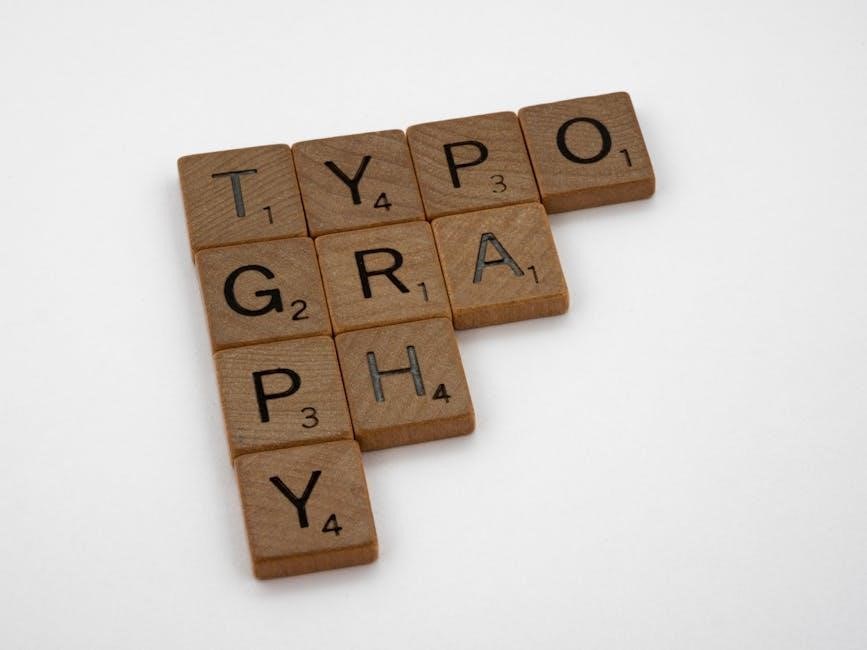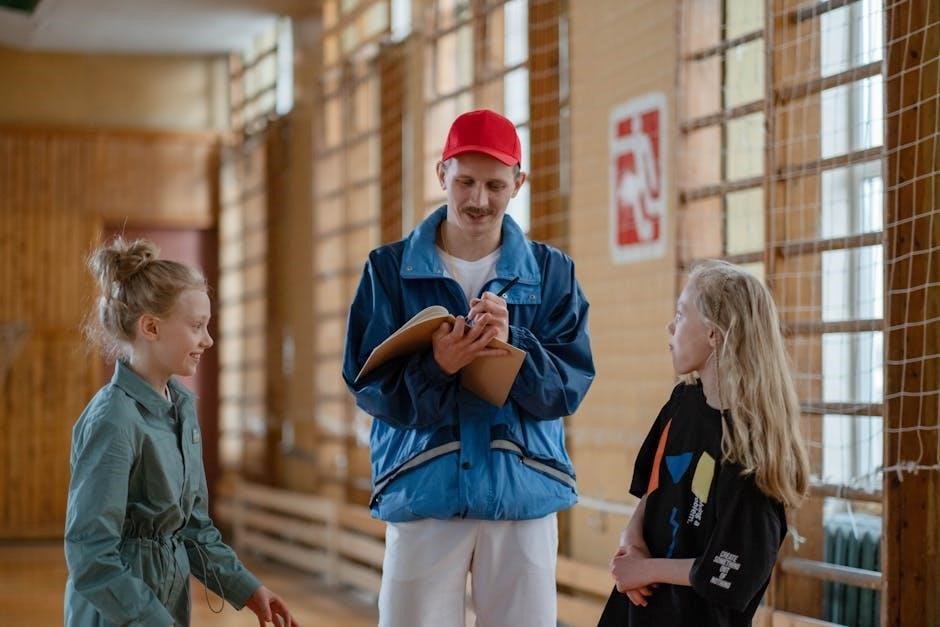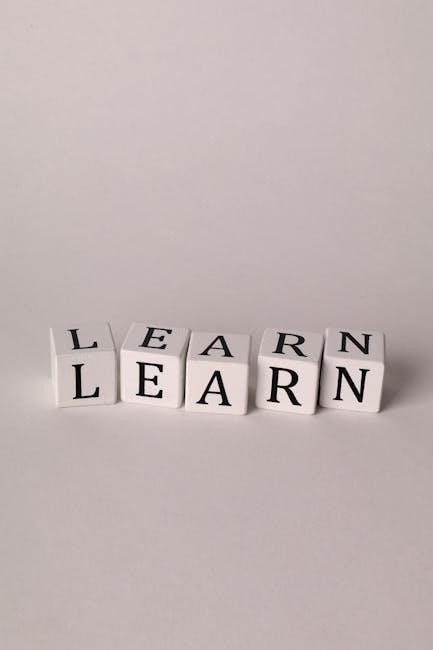Crossword clues are hints designed to lead solvers to specific answers, often requiring logic, wordplay, and vocabulary skills. They challenge the mind and entertain, making them popular worldwide.
Understanding the Basics of Crossword Puzzles
Crossword puzzles are structured grids of squares, with some filled in to form words or phrases. Clues are provided for each word, divided into “across” and “down” categories. Solving crosswords requires a mix of vocabulary, logic, and pattern recognition. Clues often use wordplay, such as puns or anagrams, to challenge solvers. For example, the clue “Instruction to play briskly” might lead to the answer “allegro,” a musical term meaning fast and lively. Crossword puzzles are popular for their mental stimulation and entertainment value. They also enhance cognitive skills like memory and problem-solving. The interplay of clues and answers creates a engaging puzzle that appeals to a wide audience.

The clue “instruction to play briskly” is a concise hint often leading to musical terms like “allegro,” testing solvers’ word knowledge and mental agility effectively.
Breaking Down the Clue
The clue “Instruction to play briskly” suggests a musical term indicating a fast tempo. “Allegro” is a common Italian musical direction meaning “quick” or “lively.” It fits the 7-letter requirement, aligning with the clue’s context. While other terms like “presto” or “vivace” exist, “allegro” is the most frequently used and recognized term for brisk playing. Thus, “allegro” effectively satisfies both the definition and length criteria of the crossword clue.
Common Answers and Definitions
The crossword clue “instruction to play briskly” often points to the musical term allegro, meaning “quick” or “lively” in Italian. This term is frequently used in crosswords due to its brevity and relevance to musical instructions. Other possible answers might include vivace or presto, but allegro remains the most common solution. These terms are essential for crossword solvers, as they bridge music and wordplay, making them popular in puzzles. Understanding these definitions helps in cracking clues efficiently, especially in crosswords that incorporate musical terminology.

Possible Solutions for “Instruction to Play Briskly”
The primary solution is “Allegro,” a 7-letter word meaning “quick” in music, commonly used in crosswords for this clue. It is a standard answer in musical contexts.
Allegro as a Musical Term
Allegro is an Italian musical term meaning “cheerful” or “lively,” commonly used to indicate a brisk or quick tempo. In crosswords, it often serves as the answer to clues like “instruction to play briskly,” as it directs musicians to perform at a lively pace. Originating from Italian, allegro is widely recognized in classical music notation, guiding orchestras and soloists to maintain a spirited rhythm. Its inclusion in crosswords highlights the intersection of music and wordplay, challenging solvers to connect cultural references with linguistic puzzles. This term is a popular choice in crosswords due to its concise definition and universal recognition in musical contexts.
Other Definitions and Contexts
While “allegro” is the most common answer for “instruction to play briskly,” other contexts may apply. In music, terms like “vivace” or “presto” also indicate speed, but “allegro” is the standard. Beyond music, “allegro” can metaphorically describe lively or energetic actions. In crosswords, clues often rely on multiple meanings, so solvers must consider both musical and non-musical interpretations. For example, “briskly” might hint at efficiency or urgency in non-musical scenarios, broadening the clue’s scope. This versatility challenges solvers to think creatively and expand their vocabulary. Understanding these varied contexts enhances problem-solving skills and enriches the crossword experience.

How to Solve Crossword Clues Effectively
Start with clues you know, use word patterns, and check letter overlaps. Practice decoding definitions and wordplay. Hint: “Instruction to play briskly” often relates to musical terms like “allegro.”
Strategies for Decoding Clues
To solve crossword clues effectively, start by identifying the most straightforward clues first, as they often provide letters that can unlock tougher ones. Pay attention to word lengths and patterns, as these can help narrow down possible answers. Anagrams are common in crosswords, so rearranging letters might reveal the solution. Additionally, understanding the context of the clue, such as whether it refers to a musical term or a common phrase, is crucial. For example, “instruction to play briskly” hints at a musical direction like allegro; Using online tools or dictionaries can also aid in verifying potential answers. Finally, practice and familiarity with crossword conventions will sharpen your problem-solving skills over time.
Using Word Patterns and Anagrams
Understanding word patterns and anagrams is crucial for solving crossword clues effectively. For the clue “instruction to play briskly,” solvers might look for patterns like synonyms for “briskly,” such as “quickly” or “fast.” Anagrams can also play a role, as rearranging letters might reveal the answer. For example, the word “allegro,” a musical term meaning “fast” or “brisk,” fits the 7-letter structure and aligns with the clue. By analyzing word lengths and potential anagrams, solvers can narrow down possibilities and decipher the answer efficiently. This method enhances problem-solving skills and ensures a systematic approach to crossword puzzles.

Musical Instructions in Crosswords
In crosswords, musical terms like “allegro” often appear, indicating a brisk tempo. This Italian word translates to “cheerful” or “quick,” making it a common clue for “play briskly.”
Understanding Musical Terms
Musical terms often appear in crossword clues, requiring solvers to think beyond standard vocabulary. For “instruction to play briskly,” the answer likely relates to musical tempo. Allegro, an Italian term meaning “quick” or “lively,” is commonly used in music to indicate a fast pace. Other terms like vivace (lively and brisk) or presto (very fast) could also fit, depending on the clue’s context. These terms are frequently used in crosswords due to their specificity and the broad knowledge they require; Solvers must recognize these musical instructions to fill in the correct answer. Such clues test both vocabulary and cultural knowledge, making them engaging and challenging for crossword enthusiasts.
Common Crossword Patterns

Crossword clues often follow specific patterns, such as wordplay, anagrams, or direct definitions. For “Instruction to play briskly,” the clue likely hints at a musical term, as music instructions are common in crosswords. The answer often involves a term like allegro, which means “quickly” or “lively” in music. Crosswords frequently use such specialized vocabulary, requiring solvers to think creatively and draw from diverse knowledge areas. Patterns may also include puns or clues that misdirect, making the puzzle more engaging. Recognizing these patterns is key to solving crosswords efficiently, as they often repeat across different puzzles. This clue exemplifies how crosswords blend logic and wordplay to challenge solvers.

Cognitive Benefits of Solving Crosswords
Solving crosswords enhances brain function by improving memory, attention, and mental agility. Regular practice can delay cognitive decline and boost overall mental sharpness and clarity.

Improving Brain Function
Solving crossword clues, such as “instruction to play briskly,” enhances brain function by stimulating memory, attention, and cognitive processing. Crosswords require the brain to retrieve and connect information, strengthening neural pathways. This mental exercise improves problem-solving skills and boosts cognitive flexibility. Regularly engaging in crosswords can delay cognitive decline and enhance overall brain health. The process of decoding clues promotes critical thinking and sharpens the mind, making it a valuable activity for maintaining mental acuity. Additionally, crosswords foster neuroplasticity, the brain’s ability to form new neural connections, which is essential for learning and adaptation. By challenging the brain, crosswords contribute to a sharper, more agile mind.

Enhancing Problem-Solving Skills
Solving crossword clues, such as “instruction to play briskly,” sharpens cognitive abilities by requiring solvers to think critically and creatively. Crosswords train the brain to analyze patterns, decode wordplay, and connect seemingly unrelated concepts. This mental exercise enhances problem-solving skills by improving memory, vocabulary, and logical reasoning. Solving crosswords also fosters patience and persistence, as solvers often need to revisit clues multiple times before finding the right answer. Additionally, crosswords encourage lateral thinking, which is valuable in real-life problem-solving scenarios. By engaging in crosswords, individuals can develop a sharper mind and a more adaptable approach to challenges, ultimately boosting their overall cognitive agility and confidence in tackling complex tasks.
The crossword clue “instruction to play briskly” leads to the answer allegro, a musical term meaning “quick” or “lively.” Solving such clues enhances vocabulary, memory, and problem-solving skills, making crosswords a rewarding mental exercise. They combine logic with creativity, offering intellectual stimulation and enjoyment. Crosswords also foster cognitive benefits, improving brain function and sharpening critical thinking. For enthusiasts, the satisfaction of decoding hints like “instruction to play briskly” makes crosswords a timeless and engaging activity. Whether for fun or cognitive improvement, crosswords remain a popular challenge that appeals to diverse skill levels.

Leave a Reply
You must be logged in to post a comment.